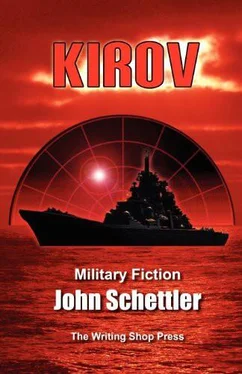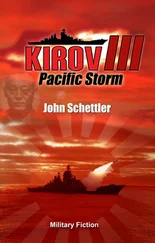John Schettler - Kirov
Здесь есть возможность читать онлайн «John Schettler - Kirov» весь текст электронной книги совершенно бесплатно (целиком полную версию без сокращений). В некоторых случаях можно слушать аудио, скачать через торрент в формате fb2 и присутствует краткое содержание. Жанр: Фантастика и фэнтези, Альтернативная история, на английском языке. Описание произведения, (предисловие) а так же отзывы посетителей доступны на портале библиотеки ЛибКат.
- Название:Kirov
- Автор:
- Жанр:
- Год:неизвестен
- ISBN:нет данных
- Рейтинг книги:5 / 5. Голосов: 1
-
Избранное:Добавить в избранное
- Отзывы:
-
Ваша оценка:
- 100
- 1
- 2
- 3
- 4
- 5
Kirov: краткое содержание, описание и аннотация
Предлагаем к чтению аннотацию, описание, краткое содержание или предисловие (зависит от того, что написал сам автор книги «Kirov»). Если вы не нашли необходимую информацию о книге — напишите в комментариях, мы постараемся отыскать её.
Kirov — читать онлайн бесплатно полную книгу (весь текст) целиком
Ниже представлен текст книги, разбитый по страницам. Система сохранения места последней прочитанной страницы, позволяет с удобством читать онлайн бесплатно книгу «Kirov», без необходимости каждый раз заново искать на чём Вы остановились. Поставьте закладку, и сможете в любой момент перейти на страницу, на которой закончили чтение.
Интервал:
Закладка:
“True,” said Karpov. “But consider this. If we are clever, and act at the appropriate moment, we can bring about a post war environment that is much more favorable to the Soviet Union. The two sides were in a race to Berlin. We got there first, and received little thanks other than thirty years of American suspicion and enmity in the cold war. We could make certain that Russian troops get much farther, establishing a much stronger position in Europe, by simply acting to delay the allied advance. If Soviet troops are standing behind the Rhine before the British and Americans get there, then there will be no Berlin Wall, no divided Germany. NATO will not sit at our doorstep and the Warsaw Pact may replace that organization altogether. Germany is the heart of Europe, and there will be no ‘West Germany’ to collaborate with Britain and the US. That is all we really need to do-delay the Western powers advance with selective intervention. By this we could strongly affect the post-war environment. It will not be the Americans with their hand on the neck of the United Nations that reigns supreme- we will dominate that body. And NATO? We can see to it that it never even exists!” He planted his finger firmly on the table as he finished, then folded his arms.
“I agree with the Captain,” said Orlov. “We need not aid the Germans in any way. To do so would be treasonous considering the hell they brought upon us in that war. My grandfather died at Stalingrad. But sticking a thorn or two in Roosevelt’s or Churchill’s bottom might prove interesting.”
The doctor spoke next. “What would be the effect if it became known that this was a Russian ship? If we were to engage a British fleet, for example, how might this affect the relationship between Great Britain and the Soviet Union. It was the British who organized and guarded the Murmansk convoys. Suppose this aid is withdrawn?”
“We can keep our identity secret,” suggested Orlov, “at least at the outset. They will most likely assume we are German, yes?”
“If I may, sir,” said Fedorov. “Engage the Royal Navy and they will stop at nothing to sink this ship. They will use their entire fleet, all their air-sea assets, and soon, in a matter of just a few months time, they will also have the United States Navy to support them.”
“They have nothing that can match us,” Orlov said derisively.
“Oh? Do you have any idea what a 15 or 16 inch shell would do to this ship if we should be hit? Even an 8 inch shell could easily penetrate the forward deck and ignite the missile fuel and warheads there, and my guess is that this ship would literally be blown to pieces in that event. We are not invulnerable.”
“But our advantage lies elsewhere,” said Karpov testily, annoyed to be arguing with a junior officer like Fedorov. “True, we have only armored certain segments of the ship, the citadels, the reactor cores. But we do not have to come anywhere near an enemy ship to deliver a barrage of precision guided firepower on the enemy. Our missiles can fire from a range of 250 kilometers or more! Our cannon can use rocket assisted munitions and range out to 50 kilometers if need be. We can stand off and destroy any fleet we encounter, and they will never even see us. The only equivalent weapon the enemy might deploy is a fleet of aircraft carriers, and we can find them with our helicopters first and sink them before they become a threat. Should any dare launch an air strike at us, our SAM defenses will be more than enough to protect us.”
“What you say is true for a time,” said the Admiral. “It was fortunate that we replenished our primary missile inventory for the live fire exercise before we were able to complete our scheduled maneuvers. We find ourselves with reloads aboard for our Moskit-IIs. But yet there is a limit to what we can accomplish, yes? We now have forty Moskit-IIs in inventory instead of only twenty, and ten each for our other missiles. That means we have a gun with 60 rounds, and after they have been fired, all we have left are the 152mm cannon and a few torpedoes, twenty, to be exact. Certainly no ship in the world can match us now, yet we must be very judicious as to how we choose to actually use the weaponry we have.”
“You are forgetting one other thing,” said Karpov, his face hard, eyes narrowed. “We have nuclear warheads aboard.”
The tension in the room seemed to elevate at once. Zolkin shifted uncomfortably, looking at the Admiral, who covered his mouth, stroking the unshaved stubble of his graying beard. “There will be no use of nuclear weapons without my expressed approval,” he said flatly. “And at the moment I do not believe we need to consider this option.”
“The enemy will have them in a matter of a few years,” said Karpov. “And they will not hesitate to use them. This we have clearly seen.”
“We will not engage anyone with nuclear weapons,” said the Admiral firmly. “Such a use would come into consideration only in the most extreme circumstances, and only after deep consideration of the effect this would have on future events. This may indeed be nothing more than a fanciful exercise of thought, gentlemen. But if we find these two ships approaching us are not modern day cruisers and destroyers in the Royal Navy inventory, then we will be faced with profound choices, decisions of greater weight than any commander in the field has ever faced in history. We must acquit ourselves well, gentlemen. For we, too, must all die one day.”
“Yet we should consider every advantage possible,” said Karpov. “War is war. This one, of all wars, was fought with utter ruthlessness and single minded determination. Are we men? We are sworn to the defense of our nation.”
“And we will defend her,” said the Admiral. “Yet we can do so without dropping a 15 kiloton warhead on London or New York. I remind you that neither Britain or the United States were enemies of the Soviet Union in 1941. We have other means-a limited inventory of conventional weapons to defend ourselves if attacked. And we also have our brains, along with the foreknowledge of every significant event in history from this day forward. With Mister Fedorov here, and his useful book, we have details that can give us a decisive edge in battle, at least for a time.”
“What book?” Karpov looked at the Navigator. “What have you been reading now, Lieutenant?”
“Sir, I have a volume of-”
“Never mind that now,” the Admiral cut him off. “Gentlemen, I assembled you all here to discuss this matter, and hear your viewpoints, but I must now remind you that this is not a democracy, not for the moment. The chain of command will prevail as always, and my decision is final in every circumstance we may encounter. Is that clear?”
Karpov’s jaw was set, but he did not directly challenge the Admiral. Orlov looked at him, but he, too, said nothing.
“Now then,” said Volsky. “Mister Fedorov, I want you to plot an approach to these two ships that are presently advancing on our position. The evidence obtained at Jan Mayen speaks loudly, yet it appears we need more jam on the blini before we will savor it. We must determine what is real and what is not here, and we must do so at our earliest opportunity.”
“If I may, Admiral,” said Fedorov. “We have other options as well. We could sail for Iceland and overfly Reykjavik as we did Jan Mayen. If this is a PSYOP, then NATO cannot hide an entire modern city from us, can they?”
“Yes we could do this, but I believe our answer is close at hand. What was this ship you believe is approaching us?”
“HMS Adventure, along with a destroyer. Adventure is a mine laying scout cruiser, not heavily armed, sir. She had four 4.7 inch guns, primarily used for anti aircraft defense, and other smaller caliber weapons. The 4.7s can range out to about 16,000 yards or so. The destroyer has the same, along with eight 21 inch torpedoes. Neither ship presents any long range threat. We would not even have to use a single missile if they sought to engage us. We could simply direct radar controlled gun fire well outside their range.”
Читать дальшеИнтервал:
Закладка:
Похожие книги на «Kirov»
Представляем Вашему вниманию похожие книги на «Kirov» списком для выбора. Мы отобрали схожую по названию и смыслу литературу в надежде предоставить читателям больше вариантов отыскать новые, интересные, ещё непрочитанные произведения.
Обсуждение, отзывы о книге «Kirov» и просто собственные мнения читателей. Оставьте ваши комментарии, напишите, что Вы думаете о произведении, его смысле или главных героях. Укажите что конкретно понравилось, а что нет, и почему Вы так считаете.












